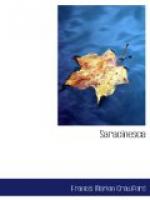No one was ever at home in the Palazzo Saracinesca in those days; there were no ladies in the house; it was a man’s establishment, and there was something severely masculine in the air of the gloomy courtyards surrounded by dark archways, where not a single plant or bit of colour relieved the ancient stone. The pavement was clean and well kept, a new flagstone here and there showing that some care was bestowed upon maintaining it in good repair; but for any decoration there was to be found in the courts, the place might have been a fortress, as indeed it once was. The owners, father and son, lived in their ancestral home in a sort of solemn magnificence that savoured of feudal times. Giovanni was the only son of five-and-twenty years of wedlock. His mother had been older than his father, and had now been dead some time. She had been a stern dark woman, and had lent no feminine touch of grace to the palace while she lived in it, her melancholic temper rather rejoicing in the sepulchral gloom that hung over the house. The Saracinesca had always been a manly race, preferring strength to beauty, and the reality of power to the amenities of comfort.
Giovanni walked home from the afternoon reception at the Embassy. His temper seemed to crave the bleak wet air of the cold streets, and he did not hurry himself. He intended to dine at home that evening, and he anticipated some kind of disagreement with his father. The two men were too much alike not to be congenial, but too combative by nature to care for eternal peace. On the present occasion it was likely that there would be a struggle, for Giovanni had made up his mind not to marry Madame Mayer, and his father was equally determined that he should marry her at once: both were singularly strong men, singularly tenacious of their opinions.
At precisely seven o’clock father and son entered from different doors the small sitting-room in which they generally met, and they had no sooner entered than dinner was announced. Two words might suffice for the description of old Prince Saracinesca—he was an elder edition of his son. Sixty years of life had not bent his strong frame nor dimmed the brilliancy of his eyes, but his hair and beard were snowy white. He was broader in the shoulder and deeper in the chest than Giovanni, but of the same height, and well proportioned still, with little tendency to stoutness. He was to all appearance precisely what his son would be at his age—keen and vigorous, the stern lines of his face grown deeper, and his very dark eyes and complexion made more noticeable by the dazzling whiteness of his hair and broad square beard—the same type in a different stage of development.
The dinner was served with a certain old-fashioned magnificence which has grown rare in Rome. There was old plate and old china upon the table, old cut glass of the diamond pattern, and an old butler who moved noiselessly about in the performance of the functions he had exercised in the same room for forty years, and which his father had exercised there before him. Prince Saracinesca and Don Giovanni sat on opposite sides of the round table, now and then exchanging a few words.




